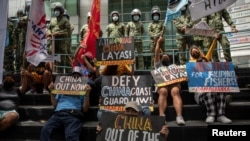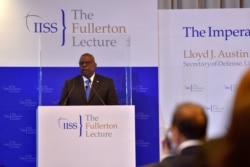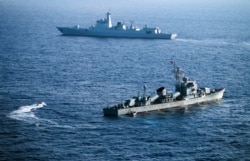On July 27, U.S. Secretary of Defense Lloyd J. Austin III visited Singapore as part of a Southeast Asian tour “to deepen America’s bonds” with its allies and partners on a host of security concerns.
Austin, who is also visiting Vietnam and the Philippines, spoke on a range of issues, from the challenges of the COVID-19 pandemic and global vaccination supply to conflict prevention and deterrence.
In asserting a “dedication to freedom of the seas,” “the rule of law,” “core international commitments,” and “an insistence that disputes will be solved peacefully,” Austin said: “This region has witnessed actions that just don’t line up with those shared principles.”
“Beijing’s claim to the vast majority of the South China Sea has no basis in international law. That assertion treads on the sovereignty of states in the region. We continue to support the region’s coastal states in upholding their rights under international law. And we remain committed to the treaty obligations that we have to Japan in the Senkaku Islands and to the Philippines in the South China Sea,” he said.
In a piece for Russian state broadcaster Sputnik, news editor Morgan Artyukhina wrote that Austin’s statements reflected “the typical pattern of American diplomatic statements on the issue of US-China relations.”
“[W]hile saying he wanted peace and stability, he also levied a slew of unsubstantiated claims at China that placed sole blame for any rifts in that relationship on Beijing’s lap,” Artyukhina wrote.
Regarding the South China Sea, she wrote: “Washington has inserted itself into a regional dispute over maritime claims in the waterway.” She added: “The nations have recently redoubled their efforts to arrive at a Code of Conduct governing interactions in the South China Sea, but the US has erroneously claimed that China is imposing its will on the other countries.”
That is false. And it’s not just the United States that has called out China’s illegal territorial machinations and intimidation of its seafaring neighbors.
China has disregarded international law, rejected court rulings at The Hague in Geneva and used naval power to assert dominance in the South China Sea.
As Polygraph.info and others previously reported, in 2009 China claimed it had “indisputable sovereignty over the islands in the South China Sea and the adjacent waters, and enjoys sovereign rights and jurisdiction over the relevant waters as well as the seabed and subsoil thereof.”
The Philippines disputed that claim with the Arbitral Tribunal at the Permanent Court of Arbitration in The Hague, alleging that China was denying the Philippines’ rights to its Exclusive Economic Zone (EEZ) and territorial waters.
The Hague rebuked China’s sweeping claims to the sea. The ruling made clear that states are entitled to operate within their EEZs, which are recognized under the 1982 U.N. Convention on the Law of the Sea (UNCLOS) as the 200-nautical mile stretch of water from the coast of a state.
Earlier this month, a Chinese Foreign Ministry spokesperson declared The Hague’s ruling “illegal, null and void.”
Moscow in years past concurred. In 2016, President Vladimir Putin said Russia agreed with and supported “China’s position to not recognize the court’s ruling.”
He said China’s decision not to participate in The Hague tribunal invalidated its ruling. Like Artyukhina, Putin added that “the involvement of any third-party powers from outside the region is detrimental and counterproductive.”
Since The Hague’s ruling, China has only beefed up militarization of the region.
In January, China’s top legislative body gave its Coast Guard a green light to fire on ships in disputed waters, inspect ships in Chinese-claimed waters and destroy structures on Chinese-claimed reefs, Reuters reported.
In February, the Voice of America reported that China will use the law granting its Coast Guard the power to fire on foreign ships to target states like Brunei, Malaysia, the Philippines, Taiwan and Vietnam, all of which have competing claims in the South China Sea.
Hostile actions were taken prior to the passage of that law.
As Polygraph.info and others have reported, China has repeatedly sunk Vietnamese fishing boats near the disputed Paracel Islands and reportedly used the threat of force to halt Vietnamese drilling projects that fall within the so-called “nine-dash line,” an arbitrarily imposed boundary that China claims gives it control over most of the South China Sea.
An April 2020 attack on a Vietnamese fishing boat drew a protest from Hanoi, to no effect. Two months later, the Chinese Coast Guard attacked another Vietnamese vessel.
Chinese vessels have also reportedly engaged in standoffs with Malaysian ships carrying out oil exploration activities within Malaysia’s economic zone.
China has established dozens of military outposts in the disputed Spratly Islands and Paracel Islands, and it seized the Scarborough Shoal, some 137 miles east of the Philippines’ island of Luzon. China’s military blockade of the shoal is illegal under The Hague’s 2016 ruling.
In March, the Philippines ramped up demands that China withdraw dozens of so-called “Maritime Militia” ships “moored, anchored and stationary at Julian Felipe Reef,” in the Spratly Islands and the Philippines’ economic zone, according to Radio Free Asia (a U.S.-funded sister news organization to VOA).
Philippines President Rodrigo Duterte has lamented that asserting the country’s rights under the 2016 ruling might lead to war.
China has built fortified artificial islands, replete with runways, hangers, anti-ship cruise missiles, anti-aircraft batteries and missile defenses, Defense News reported.
Writing for War on the Rocks, Gregory Poling, senior fellow for Southeast Asia and director of the Asia Maritime Transparency Initiative, noted that these fortified islands fit with Beijing’s strategy of using “civilian and paramilitary pressure to coerce its Southeast Asian neighbors into abandoning their rights.”
China’s sweeping maritime claims are null under international law. Polygraph.info, citing multiple experts, detailed how China's attempts to redraw the maritime boundaries of the South China Sea have no legal justification under the UNCLOS.
Although China ratified the UNCLOS and has no right to claim its decisions are not binding, experts note that the UNCLOS has no enforcement mechanism.










